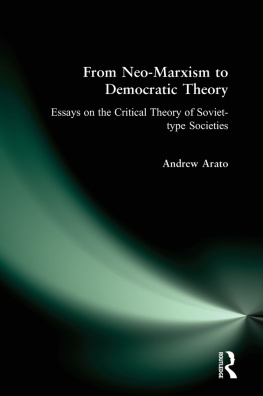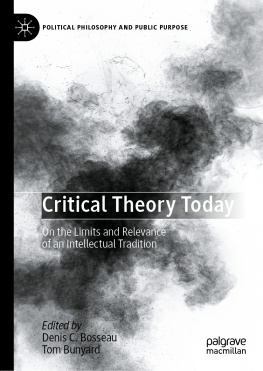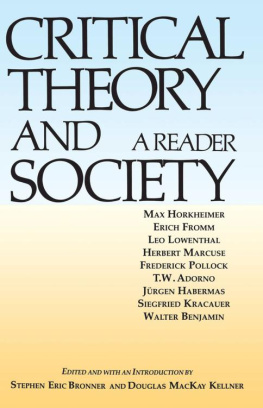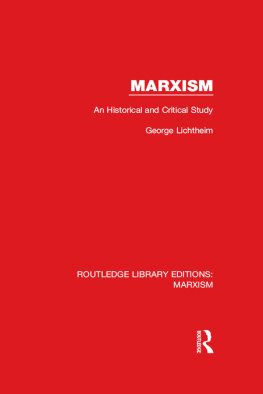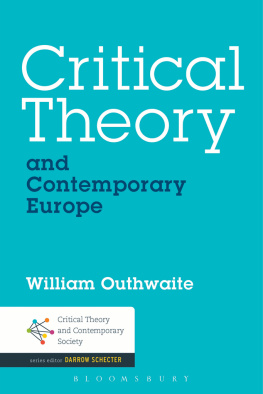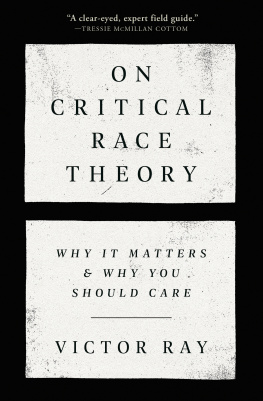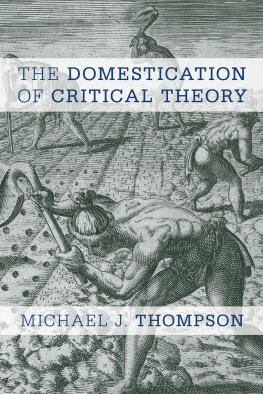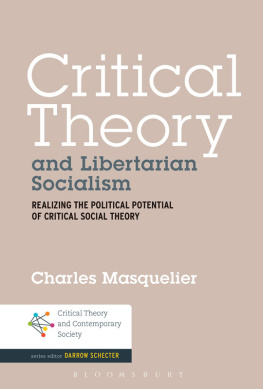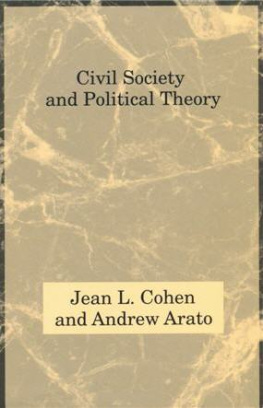From Neo-Marxism to Democratic Theory
From Neo-Marxism to Democratic Theory
Essays on the Critical Theory of Soviet-Type Societies
Andrew Arato
First published 1993
by M.E. Sharpe
Published 2015
by Routledge
2 Park Square, Milton Park, Abingdon, Oxon OX14 4RN
711 Third Avenue, New York, NY, 10017, USA
Routledge is an imprint of the Taylor & Francis Group, an informa business
Copyright 1993, Taylor & Francis. All rights reserved.
No part of this book may be reprinted or reproduced or utilised in any form or by any electronic, mechanical, or other means, now known or hereafter invented, including photocopying and recording, or in any information storage or retrieval system, without permission in writing from the publishers.
Notices
No responsibility is assumed by the publisher for any injury and/or damage to persons or property as a matter of products liability, negligence or otherwise, or from any use of operation of any methods, products, instructions or ideas contained in the material herein.
Practitioners and researchers must always rely on their own experience and knowledge in evaluating and using any information, methods, compounds, or experiments described herein. In using such information or methods they should be mindful of their own safety and the safety of others, including parties for whom they have a professional responsibility.
Product or corporate names may be trademarks or registered trademarks, and are used only for identification and explanation without intent to infringe.
Library of Congress Cataloging-in-Publication Data
Arato, Andrew.
From neo-Marxism to Democratic theory:
essays on the critical theory of Soviet-type societies /
by Andrew Arato.
p. cm.
Includes bibliographical references and index.
ISBN 0-87332-882-5 (cloth)
1. Socialism.
2. Civil society.
3. Frankfurt school of sociology.
4. Marxian sociology.
5. Europe, EasternPolitics and government1945.
6. Soviet UnionPolitics and government1945
I. Title.
HX44.A72 1992
320.5'312dc20
91-21128
CIP
ISBN 13: 9780873328821 (hbk)
To My Mother, Alice Arato
and
To the Memory of My Father, Louis Arato
1901-1977
Contents
The following essays of the last ten years are well marked by the time they were written. The first six were to be parts of a project formulated in terms of two questions: Is a critical theory of Soviet-type societies possible? Is such a theory capable of staying within the Marxian tradition in any meaningful sense? I originally intended to give a truly "dialectical" answer to these questions: yes to the first, but only on the condition of a no to the second. This answer was, however, paradoxical to the extent that critical theory from Horkheimer to Habermas always maintained its adherence in somealways changingsense to the Marxian tradition. I hoped to resolve the paradox by emphasizing an early claim of Max Horkheimer (derived from the young Gyorgy Lukcs) that Marxian critical theory alone was capable of undertaking and withstanding an uncompromising process of self-criticism. The premise, now ironical, that one could remain a Marxist without being a Marxist was indeed my most important debt to Lukacs in the 1960s and as late as the early 1980s. I wished to test this premise, by myself undertaking a reconstruction and critique of the best that critical Marxism produced on the topic of Soviet society. While the relevant analyses of classical Marxism have been often analyzed and criticized, most recently and most brilliantly by Gyorgy Mrkus, no similar effort was ever carried out in a comprehensive way for the much more interesting efforts of the "neo" and "post" Marxists: Friedrich Pollock, Herbert Marcuse, Cornelius Castoriadis, Rudolf Bahro, Ivan Szelnyi, Mihly Vajda, "Marc Rakovski," Jadwiga Staniszkis, and Mrkus himself, for example.
The presence of both Western and Eastern names on this perhaps too partial list indicates a more serious intention behind my project. In the early 1980s, for a never-to-be-published preface I wrote the following: "The question concerning the possibility of a critical theory of Soviet-type societies arises from two traditions, one West, the other East. Both the theory of the Frankfurt School and neo-Marxist social critique in East Europe appear today to be in crisis. Neither has now a living relation to social movements; individual theorists seem to have to choose between isolation and breaking with their theoretical tradition.... And yet, these two threatened traditions represent some of the very rare efforts in recent social theory to undertake critical analyses of all contemporary formations. For this reason, at a time when democratic movements East and West seem to find more to divide than to unite them, critical social theory represents the best intellectual hopes for bridge building. The crisis of theory assumes a practical meaning in this context; its reconstruction becomes a political as well as intellectual task."
I intended to contribute to such reconstruction, and to such dialogue, not so much systematically (although in my essay on Jiirgen Habermas I tried this) as by producing immanent critiques of representative versions of critical theories West and East, each time asking questions and building relations that would be possible only from a point of view that maintained the need to criticize both capitalist and state socialist formations. Given the Frankfurt School's own characteristic avoidance of the whole problem of the Soviet Union, I chose not to restrict myself to the few exceptions, such as Marcuse's relevant work. Rather, I wanted to also consider authors affected by critical theory (Szelnyi), ones belonging to parallel traditions (Castoriadis, Budapest School), and one author specifically applauded by Marcuse (Bahro). Since I also wanted to include the critical theorist who has influenced me the most, namely Habermas, despite his own rather rare pronouncements on the subject, I attempted in this case to synthesize a few of his remarks, and to begin to develop a theory around his own methodological conceptions. Beyond the chapters represented here, I also planned essays on Lukcs's generation and the October Revolution, on Jean-Paul Sartre, on revisionism and the philosophy of Praxis, and who remembers what else besides.
This project could not be completed not merely because of its internal difficulties, but because of the historical changes that affected its basic assumptions. The last six essays of the present book indicate that as the decade of the eighties progressed I came to believe that the cornerstone of a critical theory of modern society should be a democratic theory built around the concept of civil society, rather than any, even the most, "self-critical" Marxism. Hence the title of the book. I came to fully accept Jean Cohen's argument that the built-in limitation of all Marxian theory was the identification of civil and bourgeois society, and the resulting establishment of class rather than civil society as the vantage point of the critique of modern society. Increasingly, it seemed implausible that the project of a self-critique of Marxism la Lukcs could eliminate from the theory all dogmatic substantive assumptions; not only the myth of the proletariat and the methodological centrality of class but also the philosophical idea of the subject of history on which I until then always relied. With this idea in doubt, the hidden premise of my original project was greatly weakened. I gradually realized that there was no longer any reason to privilege approaches derived from the Marxian tradition, or to try to build something new out of the self-critique of a tradition fatally flawed.

